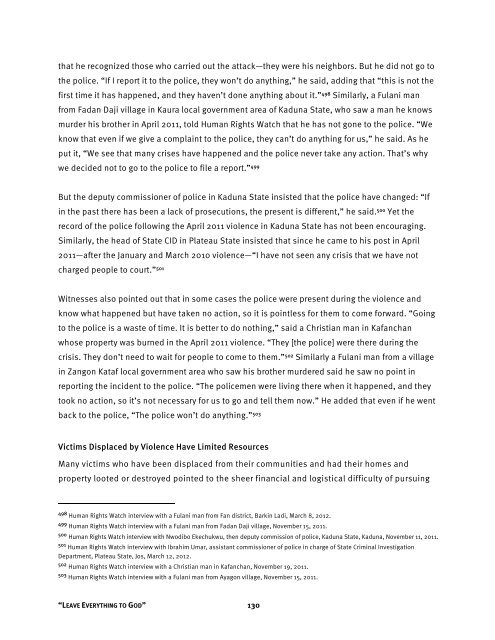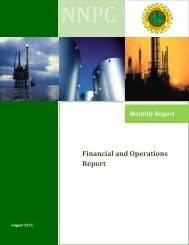You also want an ePaper? Increase the reach of your titles
YUMPU automatically turns print PDFs into web optimized ePapers that Google loves.
that he recognized those who carried out the attack—they were his neighbors. But he did not go to<br />
the police. “If I report it to the police, they won’t do anything,” he said, adding that “this is not the<br />
first time it has happened, and they haven’t done anything about it.” 498 Similarly, a Fulani man<br />
from Fadan Daji village in Kaura local government area of Kaduna State, who saw a man he knows<br />
murder his brother in April 2011, told Human Rights Watch that he has not gone to the police. “We<br />
know that even if we give a complaint to the police, they can’t do anything for us,” he said. As he<br />
put it, “We see that many crises have happened and the police never take any action. That’s why<br />
we decided not to go to the police to file a report.” 499<br />
But the deputy commissioner of police in Kaduna State insisted that the police have changed: “If<br />
in the past there has been a lack of prosecutions, the present is different,” he said. 500 Yet the<br />
record of the police following the April 2011 violence in Kaduna State has not been encouraging.<br />
Similarly, the head of State CID in Plateau State insisted that since he came to his post in April<br />
2011—after the January and March 2010 violence—“I have not seen any crisis that we have not<br />
charged people to court.” 501<br />
Witnesses also pointed out that in some cases the police were present during the violence and<br />
know what happened but have taken no action, so it is pointless for them to come forward. “Going<br />
to the police is a waste of time. It is better to do nothing,” said a Christian man in Kafanchan<br />
whose property was burned in the April 2011 violence. “They [the police] were there during the<br />
crisis. They don’t need to wait for people to come to them.” 502 Similarly a Fulani man from a village<br />
in Zangon Kataf local government area who saw his brother murdered said he saw no point in<br />
reporting the incident to the police. “The policemen were living there when it happened, and they<br />
took no action, so it’s not necessary for us to go and tell them now.” He added that even if he went<br />
back to the police, “The police won’t do anything.” 503<br />
Victims Displaced by Violence Have Limited Resources<br />
Many victims who have been displaced from their communities and had their homes and<br />
property looted or destroyed pointed to the sheer financial and logistical difficulty of pursuing<br />
498 Human Rights Watch interview with a Fulani man from Fan district, Barkin Ladi, March 8, 2012.<br />
499 Human Rights Watch interview with a Fulani man from Fadan Daji village, November 15, 2011.<br />
500 Human Rights Watch interview with Nwodibo Ekechukwu, then deputy commission of police, Kaduna State, Kaduna, November 11, 2011.<br />
501 Human Rights Watch interview with Ibrahim Umar, assistant commissioner of police in charge of State Criminal Investigation<br />
Department, Plateau State, Jos, March 12, 2012.<br />
502 Human Rights Watch interview with a Christian man in Kafanchan, November 19, 2011.<br />
503 Human Rights Watch interview with a Fulani man from Ayagon village, November 15, 2011.<br />
“LEAVE EVERYTHING TO GOD” 130




